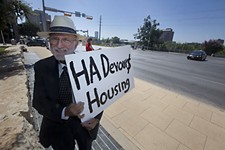Point Austin: Open Meetings, Empty Heads
No talking at City Hall unless we're all invited
By Michael King, Fri., Feb. 4, 2011

According to Rodgers, Riley let slip the revelation that council members mostly know how their colleagues are likely to vote in advance of their meetings. One might think this news would have been a mystery only to the willfully obtuse. Rodgers says he was so stunned by this discovery that he filed a complaint with Travis County Attorney David Escamilla, who is now dutifully conducting an investigation into potential violations of the Open Meetings Act.
In a moment of nicely circular logic, Rodgers told the Statesman that the fact that Escamilla is investigating his complaint tells him "something is seriously wrong at City Hall." Maybe. Or maybe it's just a sign that Escamilla is doing his job.
In the short term at least, Rodgers' action has borne predictable fruit. The lawyers have gotten hold of the matter, and last week (in executive session) told their clients – the council members – to stop meeting together for now and for God's sake don't talk to reporters about this until Escamilla finishes his review. All Riley would tell me is that, as a lawyer himself, he knows well enough to listen to the advice of his lawyers. Does he believe the members had indeed been violating the law? "No, I do not," he said, "and I believe once this investigation is complete, that view will prevail."
Meetings at City Hall?!?!
Here's the shocking news so far: Council members talk to one another and regularly prepare for meetings.
That was the gist of Rodgers' discovery in a lengthy Dec. 28 conversation with Riley, requested by Rodgers because he was considering running for council himself. Over the course of nearly three hours, Rodgers said later, Riley described the routine work of a council member, including regularly scheduled meetings of two or three members at a time (a quorum is four) to discuss ongoing business. The smoking sentence from Riley, Rodgers told the online Austin Bulldog later, was this: "We know how we are going to vote by Thursday [council meeting day] except for [Council Member Bill] Spelman, who's a wild card." Riley disputes whether he said exactly this, although – like his colleagues – he didn't dispute that it becomes clear over time which way most of the members lean on given issues, especially major ones.
Interviewed by the Bulldog's Ken Martin after the conversation but before Rodgers' Jan. 19 complaint had become public (the Bulldog's initial story was posted Jan. 25), several council members acknowledged both the meetings and their sense that they can usually surmise how other members are likely to vote. Spelman's summary is representative: "We surprise ourselves all the time. But I would say most of the time people do what I expect them to do."
Not exactly the stuff of revelation or, seemingly, scandal. But Rodgers, with Martin's considerable help, is determined to push the notion that private meetings among council members and their staff constitute de facto violations of the Open Meetings Act and are moreover evidence that the council members are colluding to determine council actions in advance of public discussion. (Rodgers calls them "secret" meetings, although the entire controversy is based upon readily available council calendars – the source of Martin's breathless report that Riley "tops the chart" for "private meetings"!)
Martin describes Rodgers as "floored" by Riley's alleged statement, and Rodgers continues: "I sat there angrily thinking about how community activists pour their time and energy into making our city a better place to live – unaware that the council's votes are set before they even walk into the council chambers." He seems to be ignoring that such public engagement actually goes on for weeks or months both in and outside of council chambers. Moreover, according to the council members, the votes are not set, as Martin himself reports: "Some council members say they can usually discern how their colleagues will vote. Some say they can't."
Rodgers must have been really, really angry, because that same day he contributed the legal limit ($350) to Riley's re-election campaign. (Rodgers told me this week he'll also contribute to a Riley opponent.) Between that day and Jan. 19, Rodgers apparently got up off the floor, decided running for office was just too burdensome (too many meetings, I would guess), and decided to call in the lawyers instead.
As for Martin – although his continuing reports have bristled with "maybes" and "possiblys" over potential violations, and he's puzzled that council members "may not be aware" of the danger – he's now convinced that only "ad hoc," unscheduled meetings are legally permissible. "Ad hoc means informal, as the need arises," he told me via e-mail, "so there would never be a violation of the act by a council member waltzing in and chatting long enough to round up a co-sponsor to post an agenda item." That's just great: We elect representatives to govern a city of nearly a million people, and then tell them they're not allowed to talk to each other unless they happen to be passing (or "waltzing") in the hall.
Anything more, they'd better post it 48 hours in advance and invite all the regulars from Citizen Communications. For that matter, the same rule would apply if more than one of them wants to attend a meeting requested by constituents outraged about a police action, a zoning decision, or the price of tomatoes – a great leap forward for good government.
Silence! Members at Work!
Martin had no trouble rustling up attorneys to support that position, including Mr. Understatement himself, former County Judge Bill Aleshire, who called the regular meetings – a known commonplace of council worklife for decades – a "structured conspiracy" to undermine the law. The Statesman – which more often devotes its thunder to complaining that City Hall engages in too much public discussion – soon jumped on the bandwagon, summoning up the specter not only of Watergate, but Churchill's World War II ("Braced for the gathering storm," Jan. 28). Sheesh.
One would hope that the county attorney will find that there is a necessary distinction between secretly conspiring to violate the law (as does happen) and simply doing the labor-intensive and time-consuming job council members were elected to do. But maybe not – perhaps the law indeed requires members to sit in their offices in solitary, brooding silence until council meeting day, when they arrive as individual blank slates in order to submit to the rotating Rule of the Noisiest. If they can't talk to one another, they surely cannot "deliberate" out loud with other citizens or their own staff members, who aren't even elected.
Or else we might move directly to government by plebiscite, with a citywide vote on every single question before the council. Wait – we already tried that, and on this exact issue – in 2006, when voters soundly rejected the dishonestly named "Clean Government" proposition, which would have required a "real-time" record of every single council member conversation. Some of the same folks are now demanding to achieve by a legalized back door what they couldn't achieve by vote. At the time, I wondered why they didn't just propose wiring up the council members for sound and video, so members would never hear or utter a thought out loud without everybody knowing it. The notion was dismissed as "silly" – and yet here it returns, as the logical consequence of an extreme and counterproductive interpretation of open meetings law. Well, if that is indeed the law, then, in the immortal words of Mr. Bumble, "The law is a ass."
I'll leave it to others to judge the lawyers.
Got something to say on the subject? Send a letter to the editor.










